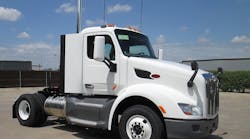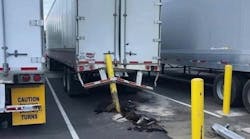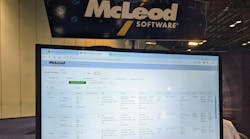At the Intelligent Transportation Society of America’s 2014 World Congress being held in Detroit this week, Peterbilt Motors Co. unveiled a Model 579 concept truck that features autonomous or self-driving capabilities – yet ones designed to help, not replace, drivers.
The main “self-operating” technologies in play on this truck include radar-based adaptive cruise control (ACC) that automatically accelerates and decelerates to maintain safe following distances along with camera-based lane departure warning systems (LDWS) to detect lane edges and striping – alerting drivers if the vehicle drifts outside its lane.
Bill Kahn, Peterbilt’s principal engineer and manager of advanced concepts, told Fleet Owner by phone that those technologies are integrated into a unique electronically-controlled steering column to provide “self-driving” capability to the truck.
“For example, it allows the truck to park itself while a driver goes into a truck stop for a meal,” he said. “And as the truck is connected to GPS, it can literally navigate the ‘last mile’ of a route on its own if drivers are in areas they are not familiar with.”
[Similar “self-driving” truck systems were showed off in Europe earlier this year: go here and here to read more about those projects.]
The ACC package on this Model 579 can also bring the vehicle to a complete stop automatically using integrated camera systems as well, he stressed.
Kahn noted that the electronically-controlled steering column is the key to this “autonomous driving” system.
“The autonomous truck of the future is an extension of existing, individual systems already available for today’s commercial vehicles,” he pointed out. “A steering column that can accept electronic messages though is the key enabler – and we really only need it to accept four or five messages to accurate maneuver the vehicle.”
Kahn added that heavy-duty trucks are “an ideal platform” for automated operation because, compared to motorists, they travel a majority of their miles on highways at constant speeds and for extended periods of time.
The two main challenges ahead wider use of “automated” truck technology centers on the broad array commercial operations trucks are involved in – resulting in many variations in payload, vehicle lengths, and work environments – as well as the frequent interchanges between different trailers in highway applications.
“The technology is not daunting in terms of ‘automating’ tractor operation – keeping a truck in the right lane at the right speed is fairly easy,” Kahn said. “It’s the many different types of trailers that truck may be connected to in the source of its operation.”
That’s because the type of trailer and payload it carries has a direct impact the operating characteristics of the tractor pulling it, he explained.
While Kahn provided no timeline as to when such “automated” truck technologies may become commercially available, he stressed that they will continue to remain a focal point of engineering development as they offer significant improvements in vehicle efficiency and safety.
“Improving safety, efficiency and performance are top priorities for the entire transportation industry. These are common goals we are collectively working toward,” Kahn said.
“Combined, these technologies – while still evolving – increase safety through continuous situational awareness, reduced driver fatigue and improved driving accuracy for superior fuel economy,” he added.



